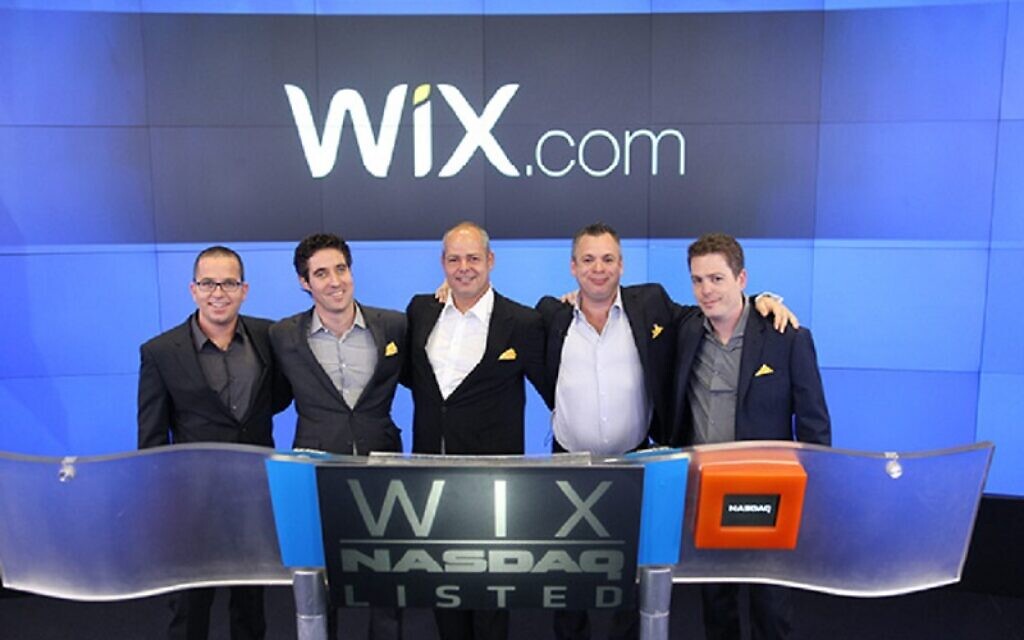Israeli tech firm Wix under the gun after activist investor Starboard acquires stake
NY-based investment firm presents maker of DIY website development software with big challenge amid push to improve performance and operations

Israeli entrepreneur Eyal Waldman told The Times of Israel in a 2017 interview before he sold the company he founded, Mellanox Technologies Ltd., to US semiconductor giant Nvidia Corp. for a massive $7 billion, that “once you become a big firm… the environment can turn hostile.”
That is probably what the management of Wix, an Israeli maker of do-it-yourself (DIY) website building software, is feeling these days, after Starboard Value LP, a US activist investor, said in a regulatory filing on September 16 it had accumulated a 9% stake in the Israeli firm in a bid to improve its performance and operations. Starboard had acquired a stake in Mellanox, too, before it was sold.
Wix shares, traded on the Nasdaq, surged on Sept. 19 following the Starboard announcement.
“Wix has significant upside potential,” Starboard said in a presentation to investors in October. The company “has an opportunity to create significant shareholder value over the next few years.”
Starboard implied in the presentation that the costs at Wix were too high, the targets set by Wix’s management too modest, and that its growth and profitability can “meaningfully improve” to be more in line with peers.
Starboard is a New York-based investment adviser that invests in publicly traded US companies.
“Starboard seeks to invest in deeply undervalued companies and actively engages with management teams and boards of directors to identify and execute on opportunities to unlock value for the benefit of all shareholders,” its website says.
Starboard did not respond to an email requesting comment, while a Wix spokesperson said the company was not commenting at this time.

According to Investopedia, an activist investor typically buys a significant minority stake in a publicly traded company in an attempt to change how it is run. The goals could be modest — giving the target company simple management tips — or more aggressive — forcing management to sell units, cut costs, restructure operations, or replace its board of directors.
Activist investors generally use published letters and private discussions with managers, shareholders, and company insiders to achieve their goals. If these efforts fail, then the activist investors could pursue a proxy contest — a campaign to win votes in opposition to management — to choose new directors who will force the company to meet their demands.
Wix is one of Israel’s flagship tech firms, often cited when talk turns to how well Israeli entrepreneurs are doing in creating and managing large, home-grown companies, both publicly traded and privately held, as opposed to selling them off early as they traditionally did in the early days of Israel’s tech journey.
At its height, Wix’s valuation was some $20 billion, as the company benefited from a surge in sales triggered by the COVID-19 pandemic. As growth jumped, so did its stock price, which outperformed software and internet companies as a whole. From January 2020 to August 2021, Wix shares shot up some 144%, according to the Starboard presentation.
At the end of 2021 the company reported 222 million registered users, of whom 6 million were paying customers, with a global presence across 180 countries.
Wix had 5,929 employees at the end of 2021, and in October started moving into its sparkling new global headquarters in northern Tel Aviv, plans for which were announced in 2019, which will be also home to chef-led restaurants and sports facilities.
Now, however, Wix management may be facing one of its biggest challenges, as it will need to navigate Starboard demands alongside its own vision for future growth.
‘Not good news’
An activist investor like Starboard “is never good news,” said Mellanox’s Waldman in a phone interview with The Times of Israel. The former CEO of Mellanox, a maker of high-speed servers and storage switching solutions, also faced Starboard activism. The US investor took a 10.7% stake in Mellanox in 2017, making it the company’s largest shareholder, and reportedly urged the firm to “improve its margins and stock and explore a potential sale.”
Following a proxy contest, in June 2018 Mellanox announced a compromise agreement regarding the members and composition of its board of directors and the setting of operating targets. Then, after the announcement of Nvidia’s acquisition of Mellanox in March 2019, Starboard said it had sold all of its stake in Mellanox.
Starboard and other activist investors “look at the short run,” Waldman said. “They have short-term view.” So, for stakeholders who “want to build real big companies over time, generally, it is not good.”
The arrival of an activist investor, added Waldman, creates “negative energy.”
In the second quarter of this year, Wix said revenue grew 9% to $345.2 million while the firm reported a loss of $111 million versus a profit of $37.6 million in the same quarter a year earlier.
Company managers are there to think for the long term, said Niron Hashai, a professor of strategy and the dean of the Arison School of Business at Reichman University in Herzliya. And the company’s board and shareholders need to keep management in check and make sure targets are met.
“If you do not let management run the business the way they want to, I see it as a negative thing, especially when shareholders often have additional interests that are not obvious,” Hashai said.
“What if they are shareholders also in a competing company? Or what if they have other non-evident interests and alien considerations that may be what push investors to become activists?
“If investors feel the firm’s managers are not doing the right thing, they can replace them at any point of time. But to get into the shoes of the CEO and start taking decisions instead of them leads to an ill-run company.”
Starboard has identified weaknesses in Wix’s performance and is seeking to up the Israeli company’s game. Wix’s shares have plunged 76% from their peak on February 19, 2021, and the firm’s market value was just $4.6 billion at the close of Oct. 25.
“Wix is undervalued, and Starboard hopes to increase its value,” said Sergey Vastchenok, senior equity analyst at Oppenheimer & Co, in a phone interview.
In its presentation about Wix, Starboard said that it believes “Wix has a significant opportunity to improve its growth and profitability,” and that the company can become a “significantly more profitable business over the next few years.”
A game of chess
“Feuds between activist investors and management are a relatively new phenomenon in Israel,” said Shirin Herzog, a partner at the Israeli law firm of Goldfarb Seligman & Co. Herzog represented Benny Landa in his 2014 pioneering proxy fight against Teva Pharmaceutical Industries Ltd., then Israel’s flagship company with a market cap close to $50 billion. “The battle between an activist investor and management is generally a multifaceted chess game.”
“The activist investor can gain many points by identifying flaws in the target company’s corporate practice and securities disclosure,” she said. “Companies can protect themselves by conducting their affairs in an adequate and fully compliant manner and by being proactive and mindful of these matters, as annoying as they may be.”
When an activist investor appears on the scene, management hitherto “minding its own business, literally and figuratively, needs now to also divert management and cost resources to the battle,” Herzog said.
During the pandemic Wix increased its spending to support the growth acceleration it witnessed in 2020 and 2021, and that led to a “dramatic reduction in profitability,” Starboard said in the presentation. As the COVID demand-surge subsided, revenue growth began to normalize, but the company’s cost structure remained elevated, “resulting in poor profitability,” the presentation said.
“Activist investors like Starboard will focus on unlocking value at Wix.com through a variety of time-tested approaches, both operationally or creating value through stock buybacks,” said Steven Schoenfeld, chief executive at MarketVector Indexes. “Ultimately, they may pressure Wix management to consider a sale to a larger firm with strong synergies.”
As growth slowed, Wix’s stock price and valuation multiple declined significantly, Starboard said. Today Wix trades at a significant discount to peers, even if the company still has strong top-line growth and a sticky customer base, Starboard said.
“Wix grew exponentially during the coronavirus period,” said Oppenheimer’s Vastchenok. And like other companies that flourished during the pandemic, such as Netflix and Zoom, it is also seeing a drop in demand. “What makes Wix unique, however,” explained Vastchenok, “is its very high cost-structure.”
Wix has “aggressively” hired employees over the last few years resulting in expenses more than doubling, Starboard said in its presentation. Total expenses surged 144% between 2018 and 2021, the data showed, with sales and marketing expenses rising 100% in the period. While Wix’s marketing headcount has risen some threefold between 2018 and 2021, its revenue has increased by just 2.1 times in the same period, the presentation said.
Wix has also more R&D employees than its largest peer, GoDaddy, despite having just one-third of GoDaddy’s revenue. Wix’s call center employee count has also grown “significantly faster” than revenue over the last few years, the presentation said.
Even before the revelation of Starboard’s stake, Wix announced in August a $150 million cost reduction plan aimed at boosting free cash flow and speeding up gross and operating margins. The company set out a financial plan in May to reach 20% free cash flow (FCF) margins by 2025.
But Starboard, in its presentation, said that it believes there can be an upside to Wix management’s margin target, and that its FCF margins “can be significantly higher than 20% by 2025.”
“For many companies 2022 was a record year for costs because many raised funds in 2021 and had the money to spend,” said Oppenheimer’s Vastchenok.
“The message in the market was: the more you invest, the more you are valued and the more you are attractive to investors. The more you recruit, the better company you are. So, all companies played this game and salaries rose,” Vastchenok said. “But now the situation has changed. Money is more expensive because interest rates are up, and valuations have come down.”
Oppenheimer upgraded the Wix stock to “outperform” from “perform” in September following the Starboard stake announcement.
“Starboard has a very good record. They are very respected activist investors, tech-focused,” said Vastchenok. “If there is no cooperation with activist investors then the Wix shares won’t perform well; if there is cooperation, all can benefit — the activists, other shareholders and management.”
There could also be a merger or a Wix sale on the cards, he said.
“Starboard owns GoDaddy, which is a competitor to Wix, so perhaps GoDaddy will buy Wix,” Vastchenok said. “I don’t think Wix wants to be sold to them, but maybe Wix will find another buyer.”
Meanwhile, on Oct. 20, Wix’s board announced a $300 million share buyback plan in a bid to boost shareholder value.
“This repurchase program, as well as last year’s $200 million share repurchase along with other initiatives, demonstrates the Board’s ongoing focus on offsetting dilution associated with stock-based compensation, reducing share count over time, and increasing shareholder value,” Wix said in a statement, announcing the plan.
What lies ahead
Wix is scheduled to publish third-quarter results on Nov. 10 and has forecast it expects total Q3 revenue to be $341 to $345 million, representing 7% to 8% year-on-year growth. For the full year, it expects revenue to grow 8% to 10% year on year. The firm said it expects free cash flow to be roughly 2% to 3% of revenue in 2022, inclusive of the cost reduction plan.
“Battles between activist investors and management could generally end in a variety of ways,” said Herzog, who is not involved in the Wix-Starboard events.
“The activist may sell its shares and go away, with or without a nice profit; the attack may act as a catalyst to another deal such as the sale of the target company, or the attack may prompt cost-cutting or other actions by management, in some cases assisting the management in implementing hard decisions.”
What can other Israeli tech firms learn from the Wix-Starboard experience that is still unfolding?
“I think companies should protect themselves, be in touch all the time with investors” to make sure they vote with them and not the activist investor, said Mellanox’s Waldman. “And they should set up a poison pill to avoid hostile takeovers and perform in a good way and bring good results, so as not to lead to activism.”
A poison pill is a defense tactic companies use to deter activist investors or other buyers from taking large stakes in their companies or staging a takeover without board approval. Mellanox did not have a poison pill, Waldman said.
Wix shares have declined 57% in the past 12 months while the Nasdaq tech-heavy stock index has dropped 27% as of Oct. 25, as tech shares have taken a battering amid higher interest rates to curb ballooning inflation and amid the repercussions of the Russian-Ukrainian war.
“Given the very weak equity market conditions so far this year, and the sharp drop in most Israeli technology stocks, it is imperative for public Israeli tech firms to focus on improving profitability and delivering shareholder value,” said MarketVector’s Schoenfeld. “The firms that survive, and ideally thrive, during these challenging times will be the ones that rise again in both business success and stock market value.”
There's no paywall on The Times of Israel, but the journalism we do is costly. As an independent news organization, we are in no way influenced by political or business interests. We rely on readers like you to support our fact-based coverage of Israel and the Jewish world. If you appreciate the integrity of this type of journalism, please join the ToI Community.

We’re really pleased that you’ve read X Times of Israel articles in the past month.
That’s why we started the Times of Israel eleven years ago - to provide discerning readers like you with must-read coverage of Israel and the Jewish world.
So now we have a request. Unlike other news outlets, we haven’t put up a paywall. But as the journalism we do is costly, we invite readers for whom The Times of Israel has become important to help support our work by joining The Times of Israel Community.
For as little as $6 a month you can help support our quality journalism while enjoying The Times of Israel AD-FREE, as well as accessing exclusive content available only to Times of Israel Community members.
Thank you,
David Horovitz, Founding Editor of The Times of Israel












